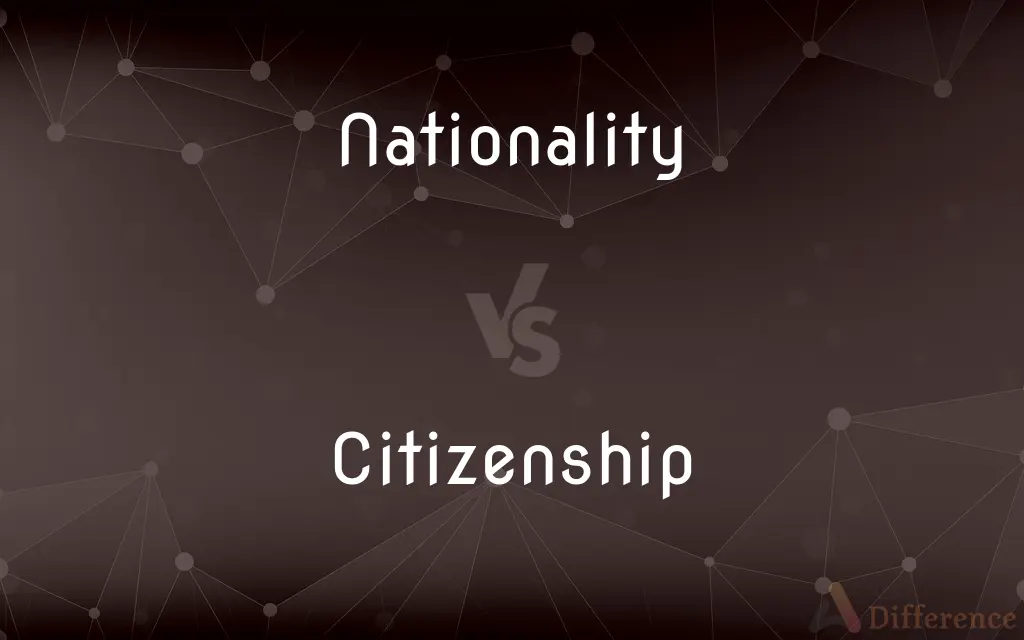Nationality vs. Citizenship — What's the Difference?
Edited by Tayyaba Rehman — By Fiza Rafique — Updated on October 13, 2023
Nationality denotes one's belonging to a nation by origin or descent. Citizenship represents one's legal membership in a specific country, often with associated rights. While nationality is inherent, citizenship can be granted or changed.

Difference Between Nationality and Citizenship
Table of Contents
ADVERTISEMENT
Key Differences
Nationality typically refers to a person's inherent connection to a particular nation or state, often determined by birth or descent. It's an identity tied to a shared history, culture, and often ethnicity. On the other hand, citizenship refers to the legal relationship between an individual and a country, conferring certain rights and responsibilities. While nationality is often immutable, citizenship can be acquired, renounced, or changed.
It's important to note that nationality can sometimes be multi-layered. For instance, someone might identify with a specific ethnic group or region within a country. However, citizenship is a more clear-cut definition, determined by legal statutes and criteria. While one can hold dual nationality, based on ancestry or birthplace, dual citizenship is a matter of legal agreements between countries.
Nationality often carries with it a sense of cultural belonging and shared values. It's a broader concept that doesn't necessarily confer any specific rights or responsibilities. Citizenship, in contrast, is a legal status that comes with particular rights, such as voting or working in a country, and responsibilities, like paying taxes or serving in the military in some countries.
In some contexts, nationality and citizenship can overlap. For instance, in many countries, being born on the territory (jus soli) grants both nationality and citizenship. However, in other scenarios, they diverge. One might have the nationality of a country due to ethnic or familial ties but not be a citizen with legal rights therein.
Comparison Chart
Definition
Connection to a nation by origin or descent.
Legal membership in a country.
ADVERTISEMENT
Conveys
Cultural or ethnic belonging.
Legal rights and responsibilities.
Acquisition
Often by birth or ancestry.
Through birth, naturalization, or legal processes.
Changeability
Generally immutable.
Can be acquired, renounced, or changed.
Dual Possibilities
One can have dual or multiple nationalities.
Dual citizenship depends on agreements between countries.
Compare with Definitions
Nationality
Origin or affiliation to a particular country.
His passport mentions his nationality as Brazilian.
Citizenship
Status conferring certain national rights and duties.
His Canadian citizenship allows him to vote in federal elections.
Nationality
Broad identity not necessarily tied to legal rights.
Her nationality is Kurdish, even though there's no Kurdish state.
Citizenship
Legal membership and rights in a specific country.
She acquired US citizenship through naturalization.
Nationality
Inherent connection to a nation by birth or descent.
His nationality is Japanese, though he lives in the US.
Citizenship
Legal relationship between an individual and a nation.
After years of residency, she attained German citizenship.
Nationality
A shared bond based on culture, history, or lineage.
She feels a strong sense of nationality during cultural festivals.
Citizenship
Legal entitlements and obligations in a nation.
With US citizenship, she has the right to work and live there indefinitely.
Nationality
Ethnic or cultural identity tied to a specific nation.
Despite growing up in Canada, her nationality remains Indian.
Citizenship
A state of being a recognized member of a country.
He renounced his Australian citizenship.
Nationality
Nationality is a legal identification of a person in international law, establishing the person as a subject, a national, of a sovereign state. It affords the state jurisdiction over the person and affords the person the protection of the state against other states.Article 15 of the Universal Declaration of Human Rights states that "Everyone has the right to a nationality," and "No one shall be arbitrarily deprived of his nationality nor denied the right to change his nationality." By international custom and conventions, it is the right of each state to determine who its nationals are.
Citizenship
Citizenship is a relationship between an individual and a state to which the individual owes allegiance and in turn is entitled to its protection.(quoted)Each state determines the conditions under which it will recognize persons as its citizens, and the conditions under which that status will be withdrawn. Recognition by a state as a citizen generally carries with it recognition of civil, political, and social rights which are not afforded to non-citizens.
Nationality
The status of belonging to a particular nation by origin, birth, or naturalization.
Citizenship
The status of a citizen with its attendant duties, rights, and privileges.
Nationality
A people having common origins or traditions and often constituting a nation.
Citizenship
The status of being a citizen, in its various senses.
Nationality
Existence as a politically autonomous entity; national independence.
Citizenship
The state of being a citizen, in its various senses.
Nationality
National character.
Citizenship
The state of being a citizen; the status of a citizen.
Nationality
Nationalism.
Citizenship
The status of a citizen with rights and duties
Nationality
National, i.e. ethnic and/or cultural, character or identity.
Citizenship
Conduct as a citizen;
Award for good citizenship
Nationality
Nationalism or patriotism.
Nationality
National origin or identity; legal membership of a particular nation or state, by origin, birth, naturalization, ownership, allegiance or otherwise.
By living in the country for five years, you are entitled to get nationality.
Stefi was born in Spain to a Brazilian father and a Chilean mother, so is eligible for three nationalities.
Please include your nationality on the form.
Nationality
A people sharing a common origin, culture and/or language, and possibly constituting a nation-state.
Nationality
(obsolete) Political existence, independence or unity as a national entity.
Nationality
The quality of being national, or strongly attached to one's own nation; patriotism.
Nationality
The sum of the qualities which distinguish a nation; national character.
Nationality
A race or people, as determined by common language and character, and not by political bias or divisions; a nation.
The fulfillment of his mission is to be looked for in the condition of nationalities and the character of peoples.
Nationality
Existence as a distinct or individual nation; national unity and integrity.
Nationality
The state or quality of belonging to or being connected with a nation or government by nativity, character, ownership, allegiance, etc.; as, to record one's nationality on identification papers; the Soviet Union had citizens of many nationalities.
Nationality
The status of belonging to a particular nation by birth or naturalization
Common Curiosities
Can someone change their Nationality?
Nationality is generally inherent and doesn't change, but one's perception or identification might evolve.
Is it possible to have multiple Nationalities?
Yes, one can identify with multiple nations due to various factors like ancestry or birthplace.
What is Nationality?
Nationality is one's connection to a nation by origin, descent, or culture.
Can someone hold dual Citizenship?
Yes, if both countries involved allow dual citizenship.
How can one acquire Citizenship?
Citizenship can be acquired by birth, descent, marriage, naturalization, or other legal means.
How is Citizenship different from Nationality?
Citizenship is a legal relationship with a country, conferring specific rights and responsibilities.
Does Nationality grant any legal rights?
Typically, nationality in itself doesn't confer legal rights; that's where citizenship comes in.
How is Nationality determined?
It's often determined by birth, ancestry, or cultural/ethnic affiliations.
Is Citizenship permanent?
While it can be lifelong, citizenship can also be renounced or revoked under certain conditions.
What happens if one renounces their Citizenship?
They lose all rights and protections granted by that country.
Is Nationality mentioned on a passport?
Yes, passports typically mention the nationality of the holder.
Who decides the rules for granting Citizenship?
Each country has its laws and regulations regarding citizenship.
Can a person's perceived Nationality differ from their legal Citizenship?
Yes, someone might culturally identify with a different nation than their legal citizenship.
Do all countries recognize dual Citizenship?
No, policies on dual citizenship vary across nations.
Why is Citizenship important?
It confers rights like voting, working, and living in a country, and responsibilities like taxation.
Share Your Discovery

Previous Comparison
Speako vs. Writo
Next Comparison
Scrap vs. ObsoleteAuthor Spotlight
Written by
Fiza RafiqueFiza Rafique is a skilled content writer at AskDifference.com, where she meticulously refines and enhances written pieces. Drawing from her vast editorial expertise, Fiza ensures clarity, accuracy, and precision in every article. Passionate about language, she continually seeks to elevate the quality of content for readers worldwide.
Edited by
Tayyaba RehmanTayyaba Rehman is a distinguished writer, currently serving as a primary contributor to askdifference.com. As a researcher in semantics and etymology, Tayyaba's passion for the complexity of languages and their distinctions has found a perfect home on the platform. Tayyaba delves into the intricacies of language, distinguishing between commonly confused words and phrases, thereby providing clarity for readers worldwide.















































